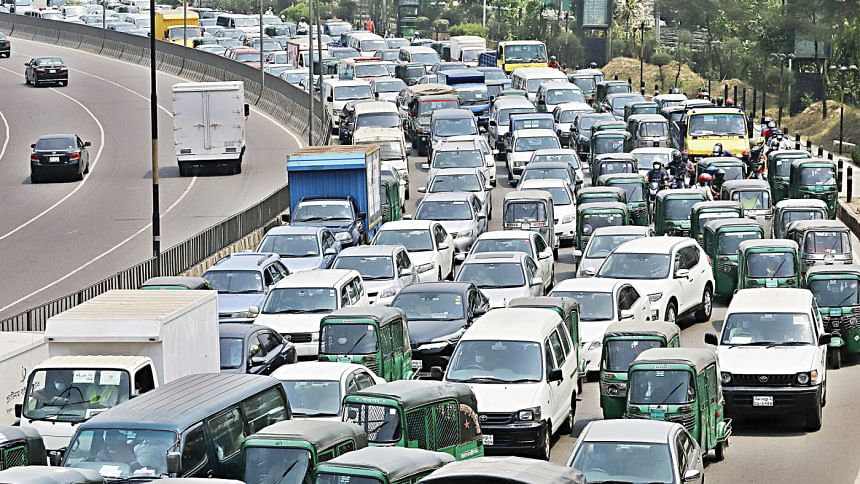Car sales plunge for higher prices, uncertainty

Sales of passenger cars declined significantly in the first quarter of 2023 owing to higher prices and macroeconomic volatility, industry people said.
Bangladesh Road Transport Authority (BRTA) data showed that 2,867 vehicles were sold between January and March, bringing the monthly average to 955 units, down 31 per cent from a monthly average of 1,391 seen in 2022.
Industry people say the three-month sales average has been the lowest in a decade.
"This year's sales have been the lowest in the past 10 years. Even during the pandemic, average sales were better although the business was hit significantly by the lockdowns," said Mohammed Shahidul Islam, secretary general of the Bangladesh Reconditioned Vehicles Importers and Dealers Association.
Sales averaged 1,033 units per month during the peak of the coronavirus pandemic in 2020.
Industry people say customers are not purchasing luxury products due to the hike in prices, the liquidity squeeze and a lack of required models of cars in the market as imports have declined significantly.
This year's sales have been the lowest in the past 10 years. Even during the pandemic, average sales were better although the business was hit significantly by lockdowns.
The price of cars has shot up by 20 to 25 per cent due to the US dollar price spike after the taka lost its value by about 25 per cent against the American greenback in the past one year owing to dollar shortages.
The dollar crunch has prompted the central bank to tighten rules to curb imports, particularly those related to non-essential and luxury items, with a view to stopping depletion of the foreign currency reserves, which have fallen by 30 per cent in the past one year.
In July last year, the central bank asked banks to take up to 100 per cent of import payments in advance from businesses while opening letters of credit (LCs) for luxury and non-essential items. This means car importers have to pay a 100 per cent margin to open LCs to bring in vehicles from abroad.
"As a result, imports have declined by at least 60 per cent in the last few months," said Islam.
Still, some retailers have imported a good number of cars fearing that the dollar might strengthen further against the taka.
Their fear is not baseless as the factors responsible for the unprecedented fall in the value of the taka such as the Russia-Ukraine war, global supply disruptions, higher commodity prices and the energy crisis are still there.
HNS Group, an importer of reconditioned cars, said its sales dropped around 50 per cent in the last three months. The company usually sells around 130 units per month but it has come down to 60 to 70 units per month now.
Islam, chairman of HNS Group, said banks are not interested in opening LCs due to the dollar crisis even if traders offer a 100 per cent margin.
Sales of Motorsbay Limited have fallen around 40 per cent this year.
Arif Khan Bipu, the proprietor of the reconditioned car importer, said the government has stopped purchasing cars for various development projects.
"It has impacted the car market. Besides, we can't open LCs. So, the sales of cars have dropped remarkably in the last few months."
Bipu said the shipment of cars from Japan, a major supplier of reconditioned cars for Bangladesh, is delayed since exporters don't make shipments before they become sure about the payments.
He suggested the government restructure the duty of hybrid cars and high-capacity microbuses in the next budget in order to reduce prices and help the industry sustain in the current difficult period.
"The government needs to encourage the imports of hybrid cars to reduce energy consumption and protect the environment."
Bipu suggested the government increase the duty on high-end cars since they are preferred by wealthy people.
Safayet Bin Taiyab, country lead (sales) at Progress Motors Import Ltd, the distributor of Germany's Audi-branded cars, said sales of both premium and non-premium passenger vehicles have declined as prices have gone up.
According to him, the company used to sell 12 units per month in the past whereas it has slipped to six to seven units now.
However, Taiyab said, there is demand for Audi cars but it can't supply as per demand since it can't import the required number of vehicles due to the difficulty in opening LCs.
Chiranjeev Roy, chief operating officer of Suzuki Car Bangladesh, echoed the same.
"We can't bring in Suzuki cars as per demand," he said.
Both Islam and Taiyab don't see any possibility for the situation to improve immediately.
"The situation will improve once the global economy returns to normalcy since Bangladesh's economy is integrated with the international economy to a significant extent," said Islam.
"The automobile market may witness a tough situation this year," said Taiyab.

 For all latest news, follow The Daily Star's Google News channel.
For all latest news, follow The Daily Star's Google News channel. 



Comments